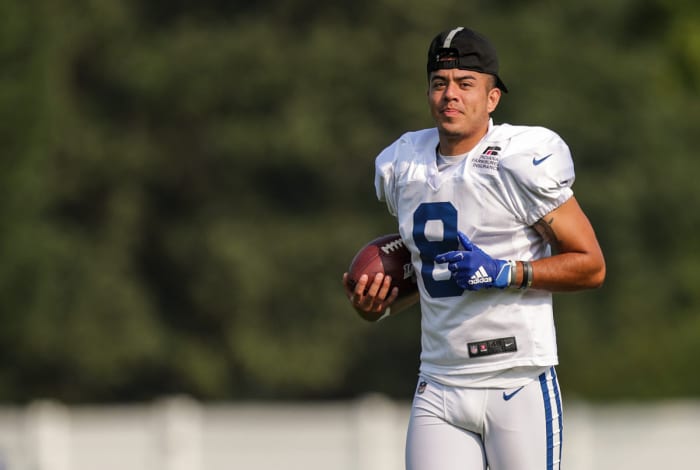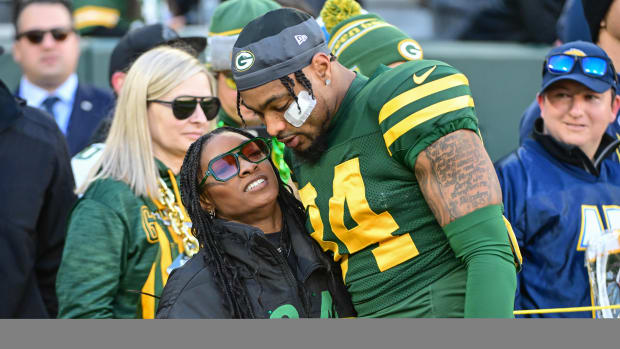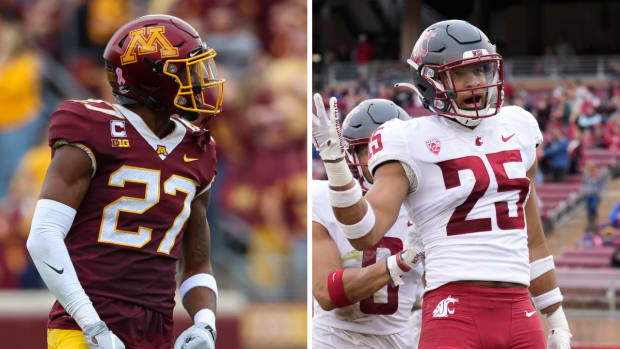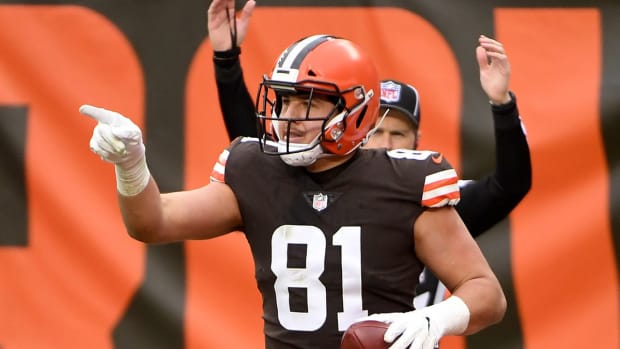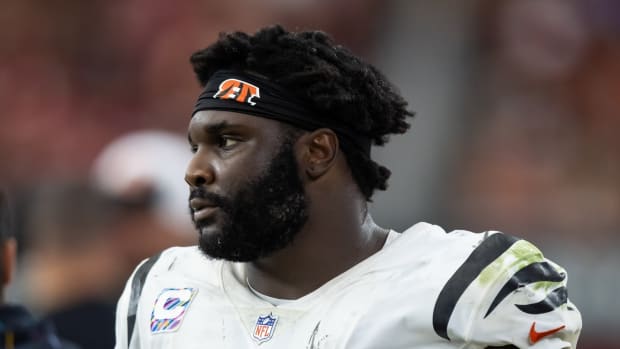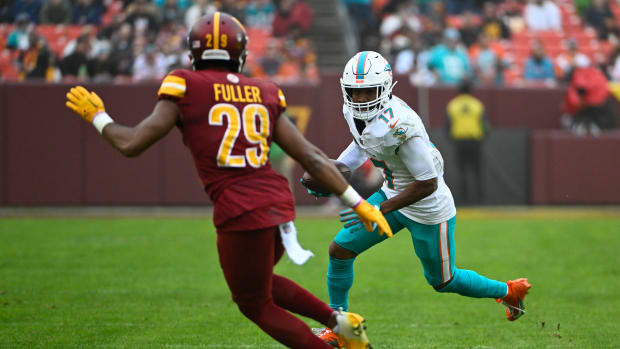How Rigo Did It
Even with the superlative smack in the name, special teams play across the NFL proved particularly remarkable last week. The Seahawks’ Michael Dickson executed a flawless double punt against the Rams. Mason Crosby and Evan McPherson blew a historic five straight field goals in the fourth quarter and overtime of Packers-Bengals. And, seconds before halftime on Monday night, Cynthia Sanchez watched in shock from home as her husband, Colts punter Rigoberto Sanchez, jogged onto the field at Baltimore’s M&T Bank Stadium and, instead of stooping to his usual holding spot, stayed standing up.
Thrust into relief duty after starter Rodrigo Blankenship suffered a hip injury, Sanchez, who doubled as a placekicker throughout his collegiate career, mustered plenty of power behind his first career attempt (running back Nyheim Hines served as the emergency holder) but hooked the 42-yarder wide left. Fortunately for Indianapolis, though, the Ravens had jumped offsides and Blankenship returned to convert from 37 on the resnap, rendering Sanchez’s cameo in the 31–25 loss a forgettable footnote … at least for most.
“I’ll be honest, I’m still kind of messed up from it,” Cynthia says the next day. “I’m not used to seeing him getting ready to wind up for a field goal. It was weird.”
Perhaps as improbable—albeit on a much broader level—was that Sanchez had reached that stage at all, booting beneath the bright lights in the last Monday Night Football game of National Hispanic Heritage Month, which ends Friday. This is by his own admission. “It’s been a crazy ride,” he says. Consider: A first-generation Mexican American, Sanchez knew next to nothing about football until some friends convinced him to sign up as a high school sophomore. “My family, we all grew up watching soccer,” he says. “So it was a big transition to even attempt to get out of my comfort zone and play a contact sport I’d never played before.”
Clearly things have changed. Where money was tight as a kid—throughout his early days on the gridiron, he owned a single football and one pair of worn-out, taped-up cleats that also served as his soccer footwear—Sanchez lives comfortably as one of only seven NFL punters signed to a deal of at least four years, sporting the league’s 10th-highest cap hit for his position. This season, his fifth, the 27-year-old is averaging a career-high 47.4 yards per punt entering Sunday’s home game against the Texans, and won AFC Special Teams Player of the Week honors in Week 4. All the while he proudly represents a demographic with tens of millions of worldwide fans yet flagging on-field presence.
“Sometimes you think you only have an opportunity because of where you’re coming from, what your parents have done, and then that limits your life,” says Sanchez, who goes by Rigo. “And for me, it was bigger than that. It was about getting out of my comfort zone and showing that just because of where we come from doesn’t mean we can’t get to the very, very top.
“And, thankfully, that all played out.”
Sanchez was raised in Hamilton City, Calif., an overwhelmingly Hispanic town north of Sacramento with fewer than 2,000 residents and one stoplight. His parents had met in the U.S. after each leaving their home country in hopes of, “making a better living than what they had in Mexico,” Sanchez says. Father Jaime picked olives and oranges before founding a landscaping company. Mother Veronica took jobs “everywhere and anywhere” while also finding time every morning to make breakfast and see her children off to school. The oldest of five, young Rigo was inspired.
“Watching them work their butts off,” he says, “it gave me the motivation that anything is possible.”
A natural talent thanks to his soccer background—“I had the leg to just boot the ball”—Sanchez also applied his parents’ work ethic to get ahead. He began training with an area coach, Abel Hernandez, who taught him the basic fundamentals (and continues to provide mentorship to this day). He devoured YouTube clips of special teamers he admired, like Justin Tucker and Sam Koch, challenging himself to match their ball flights and hang times. He took up a weightlifting program and hammered a 57-yarder as a Hamilton High senior. “I felt like I always carried myself in a professional way,” he says.
What Sanchez lacked in resources he made up for with ingenuity, laying down trash cans and gym bags as coffin-corner targets and spray-painting ladder rungs in the grass to run agility drills. The park across the street from the family home didn’t have uprights, so he and his father built a set out of PVC piping. Cynthia, a college soccer center-midfielder and forward who was shagging punts from and snapping underhanded spirals to Sanchez before they even started dating at Butte College—“I love training, so I kept tagging along,” she says—recalls seeing him running sprints one night, illuminated only by the headlights of his car.
“He’s always used what he had,” Cynthia says, “and he never complained about it.”
After two productive juco seasons at Butte, where he set single-season (11) and career (22) field goal records that still stand, Sanchez hit a roadblock that tested his determination: No D-I team wanted to sign him, leading him to sit out the 2014 season. “It was a moment where he easily could’ve said, ‘This is too hard; I don’t want to do this anymore,’ ” Cynthia says. “But he never had a Plan B.” A lifeline soon surfaced when a Butte coach put Sanchez in touch with a counterpart at Hawaii. Sanchez went to Honolulu, where as a junior he became one of only five players nationwide to perform all his team’s kicking duties (kickoffs, PATs, field goals and punts), in particular earning a reputation for mind-bending onside kicks.
Undrafted, and unsure what teams at the next level even wanted him to do, Sanchez capitalized on another connection in 2017 when he signed as a punter with the Colts, whose special teams coordinator at the time, Tom McMahon, had previously worked him out near Sanchez’s hometown. Despite his total lack of experience as a holder, Sanchez picked it up quick enough to prevail in a training camp competition for the starting job vacated by Pat McAfee’s retirement; later he was named to the Professional Football Writers Association’s all-rookie team.
“It’s crazy how everything played out,” Sanchez says.
Crazy. Sanchez says this a lot. A dozen times in a half-hour phone interview last month, to be exact. It was crazy when he was first learning the language of American football after a lifetime on the fútbol field—not to mention how to put on all that equipment. “Everything was new to me,” he says. And it was crazy that he ever “fell in love with being a punter,” as he had always considered himself a better place kicker and kickoff specialist. “I always admired the spiral coming off the foot,” he says. “But after I got to Hawaii, I just took off. I learned so much.”
Albeit in a much graver tone, Sanchez also invokes the word to summarize what he experienced late last November: “A crazy time of my life I thought would never happen.” It started on a Thursday, heading into a game against the Titans, when Sanchez developed an unfamiliar discomfort while punting at practice. “Usually I’d brush it off, fight through the pain,” he says. “This time I couldn’t handle it.” A whirlwind of scans and tests followed, and hours later Sanchez’s phone rang with a doctor delivering the news: Sanchez had been diagnosed with a cancerous tumor. (He declines to share specifically where it was located.)
But the nightmare passed. Sanchez received clearance to play, refusing to leave his team without a punter on short notice. Soon after he underwent surgery to remove the cancerous mass, which had not yet metastasized to other parts of his body. A smoke-shrouded standing ovation awaited his return following two weeks off. So did scores of get-well messages from members of the NFL special teams brotherhood, including one-time idols in Tucker and Koch. Guess how he would describe that?
“It’s crazy, because now they know my name,” Sanchez says, “And to me, that was always the goal.”
Well, not quite always. As a kid Sanchez fantasized about making it big in another sport—ideally for Barcelona, Manchester United or his dad’s favorite squad in Liga MX, Chivas de Guadalajara. He kept this dream at Hamilton City High, begging off non-kicking duties in football (receiver, defensive back, returner) out of fear of getting hurt for soccer season. Today he reflects on his decision to spurn an offer to play at a Santa Rosa, Calif., junior college and instead kick for Butte as “the hardest thing ever.”
Now? Sanchez is fully immersed in the football life. For instance: When he and Cynthia hosted a gender reveal for their soon-to-be daughter, some 70 guests exploded into applause as Cynthia snapped a powder-filled football to Rigo, who punted it with perfect form into a puff of pink. “It was just some little plastic Amazon thing, but he checked for the laces, which was hilarious,” says Cynthia, who is due in mid-November. “Spun the ball, good drop, good extension, full-on what he does on the field.”
Plenty other examples reveal how far Sanchez has come. Cynthia points to a meticulous at-home recovery regimen inspired by former Indy teammate Adam Vinatieri: “Straight to the Normatec, straight to the Theragun,” she says. Sanchez himself cites the “full-blown gym” that he installed not long ago in their garage, “with the racks and everything,” though he still enjoys hopping around area high schools to punt while Cynthia snaps. “She’ll be hard on herself when she doesn't give me a good underhand,” he says, “which is awesome because that just shows how much she pushes herself and pushes me.”
Then there are the many members of his community whom Sanchez has impacted along the way. Like the gas station owners who proudly hang his picture and jersey behind their registers. And the neighbors who boldly knock on his parents’ front door to request an autograph or picture when they see his car in the driveway. Two summers ago, Sanchez hosted a free youth football camp on his old high school field; to this day the Colts-blue T-shirts are spotted frequently around Hamilton City.
For Sanchez, these efforts point to a larger purpose: Despite the NFL’s semi-regular sojourns to Mexico City, despite one 2019 study estimating that 16% of the league’s overall fanbase was Hispanic, just seven out of nearly 1,600 NFL players who disclosed their race for the 2020 racial and gender report card, issued by The Institute for Diversity and Ethics in Sports, self-identified as Hispanic or Latinx. “I’m not from Mexico, but I’m from Mexican parents, so I think they take it personal, like, ‘Man, that’s awesome, he’s representing us,’ ” Sanchez says. “I hear it whenever I go back home. That’s really cool. I always tell my wife, it’s about the kids and the people that can get something out of what I’m doing.”
People like Jobanni Esparza. A sophomore kicker at Winston-Salem State and fellow first-generation Mexican American, the 20-year-old got to know Sanchez as a kid when he would attend the latter’s family parties. (Their dads met through a Sunday soccer league.) These days they get together in the offseason whenever Sanchez returns to Hamilton City, working out alongside a half-dozen other aspiring kickers whom Sanchez’s old coach, Hernandez, calls the 530 Bombers, after their area code. The group’s growing size is a direct result of its most successful member. “Rigo’s probably the president of the 530 Bombers,” Esparza says. “Going from a small town to D-1 to the NFL, he had a lot to do with everyone trying to kick. Just seeing Rigo, I see myself.”
No doubt Sanchez feels the same way, taking Esparza under his wing. “He’s always letting me know, ‘Whenever you need something, hit me up,’ ” Esparza says. Before the season Esparza sent video of his punting form to Sanchez for dissection; more recently they texted about Sanchez’s surprise field goal in the Ravens game. “Keep working—that’s always his words to me,” Esparza says. “I’ve always had that in the back of my head: Keep working, and good stuff will happen.
“That’s what Rigo did.”
More NFL Coverage:
• Justin Tucker Will Rock You (Or Sing You a Sweet Aria)
• Madness at 43 Yards: Inside the Bears’ Wild Kicker Competition of 2019
• Pity the Kicker: A Three-Part Mini-Series

































